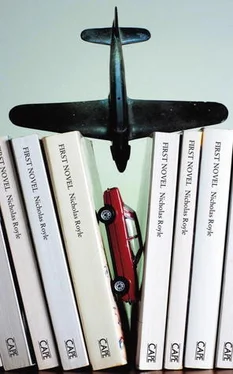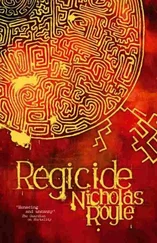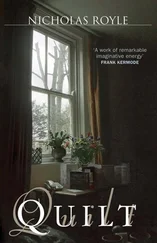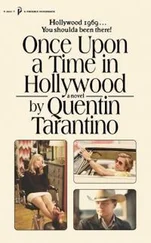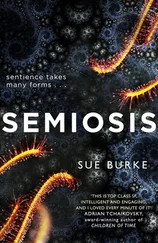‘Very popular telly, though.’
‘Yes, but your novel doesn’t feel like a commercial novel.’ I turn to look at her. ‘And L’Etranger meets The Bell Jar certainly doesn’t sound like it’s describing a commercial novel.’
‘Greg came up with that.’
‘It’s a good pitch for what sounds like a pretty serious novel.’
We both look out across the valley.
‘Meursault in L’Etranger ,’ she says, ‘he kills an Arab.’
‘Yes.’
‘In my novel, it’s a tramp rather than an Arab.’
I hesitate. Then: ‘Like the workshop piece on campus, written by someone in your group. Was that your inspiration for that element of your novel? Did you borrow it, or was that your piece?’
She doesn’t answer. I turn to look at her.
‘I think my time’s up,’ she says. ‘I don’t want to keep you from whoever’s next. Thanks… Paul.’
I note the hesitation.
That night we all gather in the snug after dinner. I read to them about the Moss Nook and the runway lights and the waitress with the ponytail and Erica and the Stockport Pyramid and the idea that this life is just a blink in eternity, that what really matters is some kind of eternal survival, if only on the outside, if only by appearance, that appearance is the same as reality, that there’s no difference between the inside and the outside, if there’s nothing inside, like in a stuffed animal where all the insides have been taken away, leaving only the skin and the appearance of the animal as it was before, how that’s no less authentic than the alternative, how you can live a life without feelings, without thoughts almost, if you have to. I read to them about how you can live without regret if you lack the capacity for regret, how you can live without distinguishing between this and that if neither this nor that has any meaning for you, how you can be either alive or dead and it makes no difference, how something can be either true or false and it makes no difference, how a story can be either yours or somebody else’s, how you can be either you or another person, how there can either be someone watching you have sex in your car or no one watching, how you can be either the man or the woman, or the man or the other man, or the woman or the other woman, how it can either make sense or not make sense, how you can be either male or female. I read to them about how you can watch either surveillance videos or amateur porn, how you can fly either a Piper or a Cessna, how you can travel either east or west, how you can go in either this direction or that direction, how you can choose either right or wrong, how you can either choose or not choose, how you can be either sane or crazy, how you can either go straight on at the junction without looking or stop at the white line, how it can all either be very important or not make a fuck of a lot of difference.
Though, arguably, most of that is subtext.
They clap when I’m done because that is the convention. I ask them if anyone has any questions and for a moment it looks as if no one has, but then someone asks me who is my favourite writer and I say I don’t think I have favourites any more. I used to avoid saying writing was either good or bad and would just say instead whether I liked it or not, whereas now I don’t know what I like and what I don’t like, nor even if I have the ability or the capacity to like or not like someone’s writing, and I think instead in terms of good and bad. There’s good writing and there’s bad writing. Someone either has it or they don’t. This is a line I’ve heard myself use before — you’ve either got it or you haven’t — in response to the perennial question ‘Can you really teach creative writing?’ If someone has it, maybe I can help them develop it and write a little bit better; if they don’t have it, I can’t give it to them or teach it to them and neither can any of my colleagues or any other creative-writing tutors anywhere in the world. If you can’t write, you can’t write, period. If your writing is bad it will always be bad. If it’s good, it could perhaps get better.
There is a pause. Then Helen asks a question.
‘We’re all writing first novels,’ she says, looking around for confirmation and receiving a few nods around the room. ‘And we know you have a particular interest in first novels because you selected all first novels for the lit course. What is it about first novels that appeals to you so much? And,’ she goes on, deadpan, ‘why is your own so difficult to get hold of?’
A few laughs greet Helen’s question; a smile seems to be in order.
‘I suppose I think first novels are important because it’s the first thing the author says about the world. People say they are autobiographical, and many are, but they’re not all. Just as often I would say that they are a mistake, or are viewed as a mistake later in an author’s career, retrospectively, either by readers and critics or by the author himself. Or herself. Sometimes they’re the best thing an author will ever write. They don’t know this at the time, of course, and in some cases maybe they’ll never see it. In others, maybe they think their first was the best and they never manage to surpass it, but in fact they do. And as for my first novel, it was published by a very small press and it went out of print. Simple as that. I haven’t done a Philip Pullman or a John Banville and either disowned or tried to suppress it. Few copies were sold and even fewer remain.’
Helen smiles and nods and then opens her mouth to speak again.
‘Well, in that case,’ she says, ‘I’m even more pleased I managed to find a copy.’
From her lap she produces a trade paperback: orange, black and white on the cover, a stylised photographic image of an Egyptian mummy, a vague geometrical hint of a pyramid in the background. The orange spine with black type: Rites by Paul Taylor.
Her trick produces a reaction from the group. One or two jaws hang down; there are even small gasps. It seems Helen is not the only student who has been looking for a copy, but she is almost certainly alone in having found one.
‘Would you mind signing it?’ she asks, thrusting it forward.
I accept the book and study the cover. The bottom corner has been folded over at some point. The spine is unbroken, but the book looks as if it has been read. It has that slightly loose look about it, the edges of the pages not quite bookshop-sharp. I look at the front cover again, the crease on the corner. A picture enters my mind of my hand returning a copy of the novel to my own bookshelf, back in another life, and doing it too hastily and catching the corner. I open the copy that Helen has handed to me. There’s no second-hand dealer’s price pencilled on the first page. Copies come up for sale extremely rarely, in any case. Not that they’re worth anything. Those that I have located and bought, I’ve tended to pay more for the postage than for the book itself.
I write ‘For Helen, Lumb Bank’, then sign and date it.
Her eyes widen as I hand the book back to her.
‘Right,’ I say, ‘I need a drink.’
Wednesday morning, everyone is seated around the large table in the dining room. I announce that we’re going to do an exercise about place. The importance of place in fiction. I tell them that I want them to imagine a place that’s important to them. It could be somewhere they’ve known since childhood. Equally it could be somewhere they went for the first time only last week. But it must be a place that has a real resonance for them, for whatever reason. I tell them I want them to write a scene set in this place featuring themselves and one other character. It could be based on a real event or entirely fictitious. It’s up to them.
While they’re off working on their submissions, I sit outside looking up the valley, instead of across it. Rising out of the trees are two huge chimneys, evidence of the march of industry up the river valleys of this part of the world in the nineteenth century. I have walked along the wooded paths that go up the valley, but I don’t remember seeing the bases of the chimneys, although I suppose I must have done.
Читать дальше
